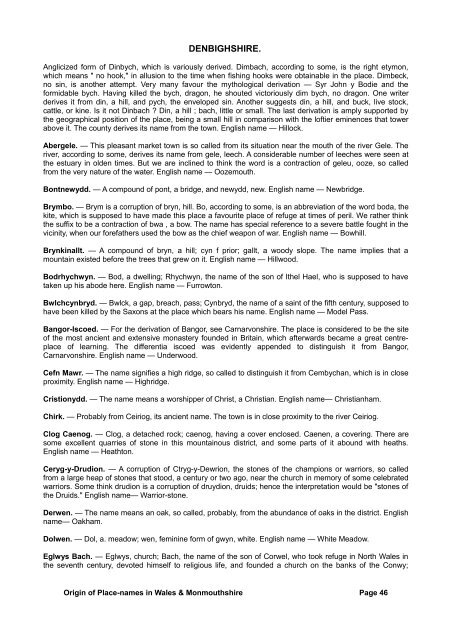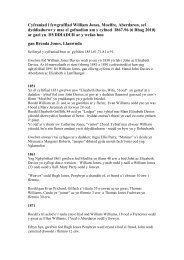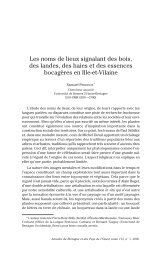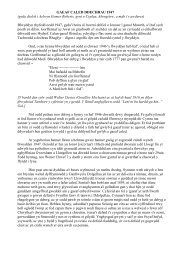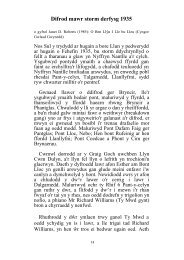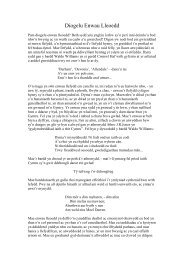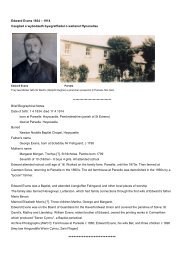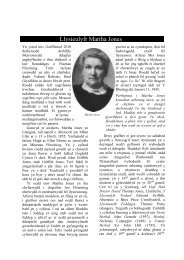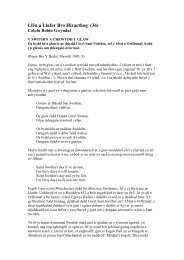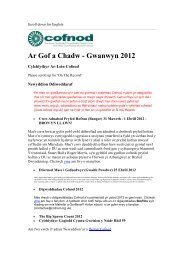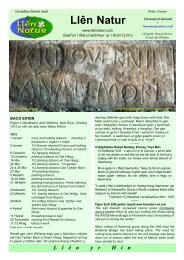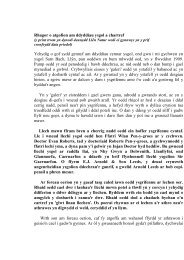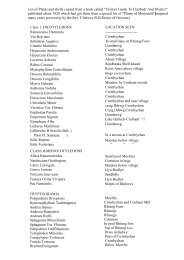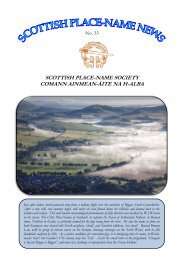Rhiw. — The name means a slope, which is <strong>in</strong> correspondence with <strong>the</strong> physical aspect <strong>of</strong> <strong>the</strong> village, be<strong>in</strong>gsituated on a ris<strong>in</strong>g em<strong>in</strong>ence. English name — Slope.Rhiwaedog. — Rhiw, slope, brow <strong>of</strong> a hill; gwaedog, bloody; signify<strong>in</strong>g <strong>the</strong> bloody brow. The <strong>place</strong> is notedfor a battle fought between Llywarch Hen <strong>and</strong> <strong>the</strong> Saxons, <strong>in</strong> which Cynddelw, his last son, felL Englishname — Bloodbrow.Roewen. — Probably a corruption <strong>of</strong> yr wy wen, <strong>the</strong> white river. A <strong>place</strong> called Gorswen is contiguous to it.English name — Whiteriver.Rhydgoch. — The name signifies <strong>the</strong> red ford. English name — Redford.Rhydclafdy. — Rhyd, a ford; clafdy, hospital; signify<strong>in</strong>g a ford near <strong>the</strong> hospital. Several <strong>names</strong> <strong>in</strong> thisneighbourhood po<strong>in</strong>t to <strong>the</strong> probability that it was once a scene <strong>of</strong> war. English name — Sickford.Rhosfawr. — Rhos, a moor; fawr-mawr, great. English name — Bigmoor.Rhoslan. — Rhos, a moor; lan-llan, a sacred <strong>in</strong>closure, a church. English name — Churchmoor.Rhostryfan. — Rhos, a moor; try fan, high <strong>place</strong>. The village is situated on a high elevated <strong>place</strong>. Englishname — Highmoor.Sarn. — The name generally means a road. Six roads meet at a certa<strong>in</strong> po<strong>in</strong>t <strong>in</strong> <strong>the</strong> village; hence <strong>the</strong> name.English name — Roadham.Trefor. — A compound <strong>of</strong> tref, <strong>place</strong>, town, <strong>and</strong> fawr, large, great. English name— Bigton.Ty'nlon. — Ty, a house; yn, <strong>in</strong>; y f <strong>the</strong>; lan, a Northwalian word for a narrow road. The name signifies ahouse <strong>in</strong> or near <strong>the</strong> road, <strong>and</strong> <strong>the</strong> village probably derived it from a farm-house <strong>of</strong> <strong>the</strong> name. English name— WayhamTalsarn. — Tal, end; sarn, road; <strong>the</strong> name signifies <strong>the</strong> end <strong>of</strong> <strong>the</strong> Roman road. Sarny Cyfiawn, <strong>the</strong> highway<strong>of</strong> <strong>the</strong> righteous Sarn Helen occurs frequently <strong>in</strong> Welsh history. Helen was a Welsh pr<strong>in</strong>cess, <strong>the</strong> daughter <strong>of</strong>Euddaf, that is, Octavius, a Cambrian pr<strong>in</strong>ce, <strong>and</strong> <strong>the</strong> wife <strong>of</strong> Maesen Wledig, or Maximus, <strong>the</strong> emperor. SarnHelen is an old Roman road, so called by <strong>the</strong> emperor <strong>in</strong> honour <strong>of</strong> his wife. English name — Roadsend.Tydwaeliog. — Some are <strong>of</strong> op<strong>in</strong>ion that <strong>the</strong> church was <strong>orig<strong>in</strong></strong>ally dedicated to Tydwal, a Welsh sa<strong>in</strong>t.English name — Tydwal.Tremadog. — The derivation <strong>of</strong> Portmadoc is almost equally applicable to this name. The only difference lies<strong>in</strong> <strong>the</strong> prefix. Tre means an abode, a town. English name — Maddock's Town.Talycafn. – Tal, front, end; y, <strong>the</strong>; cafn, a tray or trough; signify<strong>in</strong>g <strong>the</strong> head or end <strong>of</strong> <strong>the</strong> trough. The namefaithfully represents this isolated <strong>and</strong> encircled spot <strong>of</strong> <strong>the</strong> parish. English name — Troughend.Trefriw. — Tref, a <strong>place</strong>, a town; rkiw, a slope, a brow <strong>of</strong> a hill. This pretty little village is situated on a smallem<strong>in</strong>ence, comm<strong>and</strong><strong>in</strong>g an extensive view <strong>of</strong> <strong>the</strong> beautiful Vale <strong>of</strong> Llanrwst. English name — Hillton.Waenfawr. — Waen or Waun, a meadow, a common; fawr-uiawr, great; <strong>the</strong> great meadow. The site <strong>of</strong> <strong>the</strong>present straggl<strong>in</strong>g village was once a large meadow, cover<strong>in</strong>g one square mile, where <strong>the</strong> neighbour<strong>in</strong>gfarmers were wont to turn <strong>the</strong>ir cattle <strong>in</strong> <strong>the</strong> summer to graze, <strong>and</strong> quench <strong>the</strong>ir thirst <strong>in</strong> <strong>the</strong> river Gwyrfai.English name— Great Meadow.Ynys Enlli. — The name signifies an isl<strong>and</strong> <strong>in</strong> <strong>the</strong> sea. The English called it Bardsey Isl<strong>and</strong>, <strong>the</strong> isle <strong>of</strong> <strong>the</strong>bards. It is said that <strong>the</strong> bards resorted <strong>the</strong>re, preferr<strong>in</strong>g solitude to <strong>the</strong> <strong>in</strong>trusion <strong>of</strong> foreign <strong>in</strong>vaders. Englishname — Seal<strong>and</strong>.Orig<strong>in</strong> <strong>of</strong> Place-<strong>names</strong> <strong>in</strong> Wales & Monmouthshire Page 45
DENBIGHSHIRE.Anglicized form <strong>of</strong> D<strong>in</strong>bych, which is variously derived. Dimbach, accord<strong>in</strong>g to some, is <strong>the</strong> right etymon,which means " no hook," <strong>in</strong> allusion to <strong>the</strong> time when fish<strong>in</strong>g hooks were obta<strong>in</strong>able <strong>in</strong> <strong>the</strong> <strong>place</strong>. Dimbeck,no s<strong>in</strong>, is ano<strong>the</strong>r attempt. Very many favour <strong>the</strong> mythological derivation — Syr John y Bodie <strong>and</strong> <strong>the</strong>formidable bych. Hav<strong>in</strong>g killed <strong>the</strong> bych, dragon, he shouted victoriously dim bych, no dragon. One writerderives it from d<strong>in</strong>, a hill, <strong>and</strong> pych, <strong>the</strong> enveloped s<strong>in</strong>. Ano<strong>the</strong>r suggests d<strong>in</strong>, a hill, <strong>and</strong> buck, live stock,cattle, or k<strong>in</strong>e. Is it not D<strong>in</strong>bach ? D<strong>in</strong>, a hill ; bach, little or small. The last derivation is amply supported by<strong>the</strong> geographical position <strong>of</strong> <strong>the</strong> <strong>place</strong>, be<strong>in</strong>g a small hill <strong>in</strong> comparison with <strong>the</strong> l<strong>of</strong>tier em<strong>in</strong>ences that towerabove it. The county derives its name from <strong>the</strong> town. English name — Hillock.Abergele. — This pleasant market town is so called from its situation near <strong>the</strong> mouth <strong>of</strong> <strong>the</strong> river Gele. Theriver, accord<strong>in</strong>g to some, derives its name from gele, leech. A considerable number <strong>of</strong> leeches were seen at<strong>the</strong> estuary <strong>in</strong> olden times. But we are <strong>in</strong>cl<strong>in</strong>ed to th<strong>in</strong>k <strong>the</strong> word is a contraction <strong>of</strong> geleu, ooze, so calledfrom <strong>the</strong> very nature <strong>of</strong> <strong>the</strong> water. English name — Oozemouth.Bontnewydd. — A compound <strong>of</strong> pont, a bridge, <strong>and</strong> newydd, new. English name — Newbridge.Brymbo. — Brym is a corruption <strong>of</strong> bryn, hill. Bo, accord<strong>in</strong>g to some, is an abbreviation <strong>of</strong> <strong>the</strong> word boda, <strong>the</strong>kite, which is supposed to have made this <strong>place</strong> a favourite <strong>place</strong> <strong>of</strong> refuge at times <strong>of</strong> peril. We ra<strong>the</strong>r th<strong>in</strong>k<strong>the</strong> suffix to be a contraction <strong>of</strong> bwa , a bow. The name has special reference to a severe battle fought <strong>in</strong> <strong>the</strong>vic<strong>in</strong>ity, when our forefa<strong>the</strong>rs used <strong>the</strong> bow as <strong>the</strong> chief weapon <strong>of</strong> war. English name — Bowhill.Brynk<strong>in</strong>allt. — A compound <strong>of</strong> bryn, a hill; cyn f prior; gallt, a woody slope. The name implies that amounta<strong>in</strong> existed before <strong>the</strong> trees that grew on it. English name — Hillwood.Bodrhychwyn. — Bod, a dwell<strong>in</strong>g; Rhychwyn, <strong>the</strong> name <strong>of</strong> <strong>the</strong> son <strong>of</strong> I<strong>the</strong>l Hael, who is supposed to havetaken up his abode here. English name — Furrowton.Bwlchcynbryd. — Bwlck, a gap, breach, pass; Cynbryd, <strong>the</strong> name <strong>of</strong> a sa<strong>in</strong>t <strong>of</strong> <strong>the</strong> fifth century, supposed tohave been killed by <strong>the</strong> Saxons at <strong>the</strong> <strong>place</strong> which bears his name. English name — Model Pass.Bangor-Iscoed. — For <strong>the</strong> derivation <strong>of</strong> Bangor, see Carnarvonshire. The <strong>place</strong> is considered to be <strong>the</strong> site<strong>of</strong> <strong>the</strong> most ancient <strong>and</strong> extensive monastery founded <strong>in</strong> Brita<strong>in</strong>, which afterwards became a great centre<strong>place</strong><strong>of</strong> learn<strong>in</strong>g. The differentia iscoed was evidently appended to dist<strong>in</strong>guish it from Bangor,Carnarvonshire. English name — Underwood.Cefn Mawr. — The name signifies a high ridge, so called to dist<strong>in</strong>guish it from Cembychan, which is <strong>in</strong> closeproximity. English name — Highridge.Cristionydd. — The name means a worshipper <strong>of</strong> Christ, a Christian. English name— Christianham.Chirk. — Probably from Ceiriog, its ancient name. The town is <strong>in</strong> close proximity to <strong>the</strong> river Ceiriog.Clog Caenog. — Clog, a detached rock; caenog, hav<strong>in</strong>g a cover enclosed. Caenen, a cover<strong>in</strong>g. There aresome excellent quarries <strong>of</strong> stone <strong>in</strong> this mounta<strong>in</strong>ous district, <strong>and</strong> some parts <strong>of</strong> it abound with heaths.English name — Heathton.Ceryg-y-Drudion. — A corruption <strong>of</strong> Ctryg-y-Dewrion, <strong>the</strong> stones <strong>of</strong> <strong>the</strong> champions or warriors, so calledfrom a large heap <strong>of</strong> stones that stood, a century or two ago, near <strong>the</strong> church <strong>in</strong> memory <strong>of</strong> some celebratedwarriors. Some th<strong>in</strong>k drudion is a corruption <strong>of</strong> druydion, druids; hence <strong>the</strong> <strong>in</strong>terpretation would be "stones <strong>of</strong><strong>the</strong> Druids." English name— Warrior-stone.Derwen. — The name means an oak, so called, probably, from <strong>the</strong> abundance <strong>of</strong> oaks <strong>in</strong> <strong>the</strong> district. Englishname— Oakham.Dolwen. — Dol, a. meadow; wen, fem<strong>in</strong><strong>in</strong>e form <strong>of</strong> gwyn, white. English name — White Meadow.Eglwys Bach. — Eglwys, church; Bach, <strong>the</strong> name <strong>of</strong> <strong>the</strong> son <strong>of</strong> Corwel, who took refuge <strong>in</strong> North Wales <strong>in</strong><strong>the</strong> seventh century, devoted himself to religious life, <strong>and</strong> founded a church on <strong>the</strong> banks <strong>of</strong> <strong>the</strong> Conwy;Orig<strong>in</strong> <strong>of</strong> Place-<strong>names</strong> <strong>in</strong> Wales & Monmouthshire Page 46
- Page 1 and 2: HANDBOOK OF THE ORIGIN OF PLACE-NAM
- Page 3 and 4: § § § § §The Author begs to st
- Page 5 and 6: pitiful cries of the railway offici
- Page 7 and 8: Bishop Percy says that "in England,
- Page 9 and 10: The city of Chester is still popula
- Page 11 and 12: There's Cumwhitton, Cumwhinton, Cum
- Page 13 and 14: Llwyn in its primary' sense means a
- Page 15 and 16: PLACE-NAMES IN WALES.Wales. — The
- Page 17 and 18: Church are generally dedicated to e
- Page 19 and 20: think he was a contemporary of St.
- Page 21 and 22: Rhosbeirio. — Rhos, a moor, a dry
- Page 23 and 24: of Brecknock," states that this vic
- Page 25 and 26: Cam cnwir ef Cwmdu,Cwm gwyn yw & n
- Page 27 and 28: Penderyn. — A corruption probably
- Page 29 and 30: Ardudwy. — Ar, upon or above; tud
- Page 31 and 32: to mark its pre-eminence over the o
- Page 33 and 34: Some think that eirw is a corruptio
- Page 35 and 36: present form — Caerfyrddin.Abergw
- Page 37 and 38: place of refuge; hence the name. En
- Page 39 and 40: Llansawyl. — The church was dedic
- Page 41 and 42: eject. The village took its name fr
- Page 43 and 44: house, and attempted to kill an inf
- Page 45 and 46: Gwydir. — Prima facie one may tak
- Page 47: Nefyn. — The church was probably
- Page 51 and 52: Llangollen. — From Collen, a sain
- Page 53 and 54: hands into their pockets to pay a c
- Page 55 and 56: Cefn. — The name signifies a ridg
- Page 57 and 58: Maesgarmon. — Named in honour of
- Page 59 and 60: Abertridwr. — Tridwr, three water
- Page 61 and 62: it is said, was originally built by
- Page 63 and 64: Cwmllynfell. — Cwm, a narrow vale
- Page 65 and 66: Gwarycaeau. — Gwdr, the nape of t
- Page 67 and 68: means a cultivated region, a vale,
- Page 69 and 70: Penrhiwfer.- Pen, head, top; rhiw,
- Page 71 and 72: Port Talbot. — So called in 1835
- Page 73 and 74: Trealaw. — This appellation was g
- Page 75 and 76: Aberdyfi. — So called from its si
- Page 77 and 78: Llanddwywe. — From Dwywau, a desc
- Page 79 and 80: Crickhowell and some in the directi
- Page 81 and 82: Griffithstown. — This village was
- Page 83 and 84: and gwy, water. Treiddiod troth tna
- Page 85 and 86: derive Tintern from din, fortified
- Page 87 and 88: Caersws. — It appears that the Ro
- Page 89 and 90: English name — Ervylton.Llanymech
- Page 91 and 92: Angle. — Probably from the angle-
- Page 93 and 94: Gellyswick. — Another hybrid. Gel
- Page 95 and 96: that the two rivers in their flowin
- Page 97 and 98: ecame the bishop of the see, and wa
- Page 99 and 100:
earth formerly stood on a summit on
- Page 101 and 102:
Pilleth. — A corruption of pwll,
- Page 103 and 104:
Howells, Rev. J., Mountain AshHowel
- Page 105 and 106:
Williams, D., PenywernWilliams, Rev


